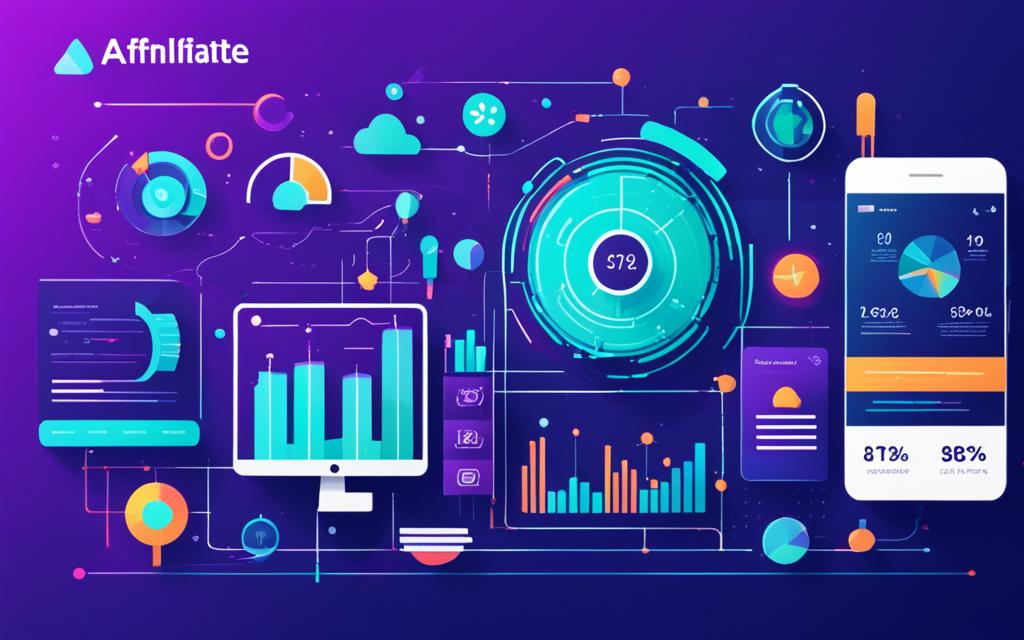What if I told you artificial intelligence could totally change your affiliate marketing? It can take your strategies to new heights you haven’t seen before.
In today’s competitive market, using AI in marketing is a must. This article talks about how AI can make your campaigns much better and boost your ROI. By using machine learning with your marketing data, you can work more efficiently and precisely.
Let’s look into how AI can change affiliate marketing and help you stay top in the game.
The Role of AI in Affiliate Marketing
Artificial intelligence (AI) has changed affiliate marketing for the better. It offers advanced AI capabilities that help marketers work smarter and stand out. AI in affiliate marketing is essential for success in the digital world today.
Understanding AI in Marketing
AI can quickly process and analyze lots of data. It spots trends and predicts behaviors that humans might miss. This means marketers get automated marketing insights that are detailed and useful. With AI, they can understand customer behavior better. This leads to more effective strategies and better results.
Benefits of AI Integration
Using AI in affiliate marketing brings many benefits. It notably improves performance. With AI capabilities, campaigns can be optimized instantly. This maximizes return on investment and makes marketing budgets go further.
AI also delivers automated marketing insights fast. This lets marketers make quick, informed decisions. They can adjust their strategies as needed, based on the latest data. This technology helps make marketing more personalized and successful.
AI Tools for Data Analysis in Affiliate Marketing
Affiliate marketing is changing fast. AI Analytics Platforms are now key. They help us learn important lessons from tons of data. Let’s look at the best tools helping us make marketing decisions based on data.
Popular AI Tools
Several AI Analytics Platforms shine for their power and ease of use. Here’s a list of top tools in the market:
- Google Analytics: A highly versatile tool that offers comprehensive data analysis and reporting capabilities.
- HubSpot: Known for its user-friendly interface, HubSpot integrates well with other marketing tools.
- SAS: Offers advanced analytics, data management, and business intelligence solutions.
- IBM Watson: Renowned for its machine learning capabilities and in-depth data analysis.
These tools stand out for their detailed insights and efficient data handling. They make data-driven marketing easier and more effective.

How to Choose the Right AI Tool
Choosing the right AI tool means looking at several tool selection criteria. Think about these points:
- Budget Considerations: Ensure the tool aligns with your budget without compromising essential features.
- Integration Capabilities: The tool should seamlessly integrate with your existing marketing platforms.
- User-Friendliness: Consider how easy it is for your team to learn and use the tool.
- Support and Updates: Opt for tools with reliable customer support and regular updates for continuous improvement.
Think about these factors to choose an AI Analytics Platform that fits your marketing needs. It will ensure your marketing strategies are based on solid data.
Now, let’s summarize these tools in a detailed table.
| AI Tool | Key Features | Pros | Cons |
|---|---|---|---|
| Google Analytics | Comprehensive data analysis, reporting | High versatility | Steep learning curve |
| HubSpot | Integration with marketing tools, user-friendly | Easy to use | Costly for small businesses |
| SAS | Advanced analytics, business intelligence | In-depth data management | High cost |
| IBM Watson | Machine learning, in-depth analysis | Powerful capabilities | Complex setup |
Optimizing Affiliate Marketing Strategies with AI
Using AI in affiliate marketing makes measuring performance and running operations more efficient. AI can analyze a lot of data and work on its own, making strategies better. Let’s look into why this integration is important.
Identifying Key Performance Indicators (KPIs)
Knowing your KPIs is key in improving affiliate marketing strategies. AI tools help track many metrics, like:
- Click-through Rates (CTR)
- Conversion Rates
- Customer Acquisition Cost (CAC)
- Return on Investment (ROI)
These indicators show if campaigns are working and where to make them better.
Automating Processes
AI makes it easy to do repeat tasks in affiliate marketing. This marketing automation covers:
- Personalized Content Distribution
- Email Campaigns
- Performance Measurement Reports
This automation saves time and makes sure marketing fits the audience well. It makes campaigns perform better.
| Feature | Benefit | Example |
|---|---|---|
| Personalized Content Distribution | Increases engagement by delivering tailored content | Recommended products based on user behavior |
| Email Campaigns | Automated outreach to prospects and customers | Scheduled promotional emails |
| Performance Measurement Reports | Provides actionable insights for strategy enhancement | Weekly performance dashboards |
So, using AI can change affiliate marketing campaigns a lot. It makes them more efficient and powerful.
Leveraging Data Analysis for Better Results
In affiliate marketing, using data analysis and artificial intelligence can really boost results. I’ve learned how analyzing campaigns leads to smarter decisions. This has greatly improved our marketing efforts. The use of machine learning helps us understand what our customers want by analyzing their behavior.

Analyzing key metrics and performance indicators is crucial. It helps campaigns stay up-to-date with market changes. Tailoring offers to specific groups is key. It meets customer needs and makes our marketing work better.
It’s important to see what parts of a campaign work best. This helps make informed choices. For instance, looking at conversion rates shows where to put more effort. Paying attention to click-through rates and how people interact with our ads helps us get better over time.
Below is a look at some data analysis tools, their features, and benefits:
| Tool | Main Features | Uses |
|---|---|---|
| Google Analytics | Traffic analysis, user behavior | Evaluating website performance |
| HubSpot | Lead management, CRM | Tracking inbound marketing efforts |
| SEMrush | SEO, competitor analysis | Improving search engine rankings |
With these advanced tools, we can really improve our campaigns. Focusing on data-driven decisions helps us grow in the competitive world of affiliate marketing.
Real-Time Optimization Techniques
In the fast-paced world of affiliate marketing, staying ahead is crucial. Real-time optimization is key. It allows for instant changes and tailoring, boosting campaign success. We’ll look at two main areas: adaptive campaigns and dynamic content delivery.
Adaptive Campaigns
Adaptive campaigns are vital for successful affiliate marketing. They let campaigns quickly adjust to market shifts. Thanks to Campaign Adaptability, and AI Real-Time Adjustments, marketers can fine-tune their strategies with live data. This leads to better performance.
Dynamic Content Delivery
Dynamic content delivery pushes Content Personalization further. It tailors content to each user’s likes. With AI, real-time data turns into highly relevant, engaging content. This not only makes the user experience better but also boosts conversions.
| Feature | Benefit |
|---|---|
| Campaign Adaptability | Ensures campaigns can respond to market changes instantly |
| AI Real-Time Adjustments | Allows for continuous optimization based on live data |
| Content Personalization | Delivers highly relevant content to users, increasing engagement and conversions |
Case Examples of Successful AI-Driven Affiliate Marketing Campaigns
Looking at successful AI-driven affiliate marketing can teach us a lot about boosting our marketing. Strategic insights from these case studies show the power of AI. They help set high standards for us to reach.
Case Study 1
Amazon is a great example of AI in action. They used AI to make their affiliate marketing better. By predicting what customers might buy, Amazon offered personal recommendations. This made their sales go up.
They used AI for analyzing user data fast, showing buyers products they’d like. Sales went up and customers kept coming back, happy with their purchases.
Case Study 2
Nike also made a smart move by using AI chatbots for affiliate marketing. These chatbots, powered by AI, could chat in a personalized way with users. They suggested products uniquely suited to each user based on fresh data.
This cool AI use made more people get involved and lifted Nike’s affiliate sales. It’s a strong example of success with AI marketing.
Lessons Learned
From these case studies, we learn important strategic insights:
- Keeping things personal makes customers more engaged and likely to buy.
- Using latest data lets marketing strategies change as needed.
- AI, like learning algorithms and chatbots can increase sales and make shopping better.
Using these tips in your marketing can help achieve success like in the case studies. It could lead to growth and a stronger position among competitors for your brand.
Measuring the Effectiveness of AI-Based Strategies
It’s very important to measure how well AI-based affiliate marketing strategies work. This means doing a thorough ROI Analysis, keeping an eye on the most important AI Metrics, and always being ready to make changes. By looking at the key performance indicators and always trying to do better, we learn more about our campaigns and how to improve them.
Key Metrics to Monitor
To evaluate your AI-driven strategies well, you must know which metrics to look at. Here are a few important ones:
- Conversion Rate: This shows the rate at which people do what you want them to do.
- Customer Lifetime Value (CLV): This is all the money you can expect to make from a customer over time.
- Cost Per Acquisition (CPA): It tells us how much it costs to get a new customer.
- Return on Investment (ROI): This is a key measure to see how financially successful our strategies are.
Continuous Improvement
Always trying to get better is key to making the most of AI strategies. By doing regular ROI Analysis and keeping track of the best AI Metrics, we make sure our campaigns are working well and improving. Strategic Refinement helps us find and fix areas that could be better quickly.
In today’s ever-changing market, using data to keep improving is a must for lasting success in affiliate marketing. By fine-tuning our approaches, we’re laying the groundwork for growth and more profits in the long run.
Common Pitfalls and How to Avoid Them
When adding AI to affiliate marketing, knowing its strengths and limits is vital. AI offers excellent data analysis and automation. But it can’t fix every issue without human input. This approach may cause big strategy errors.
To tackle these marketing hurdles, ensure data quality is top-notch for correct analysis. Poor data leads to wrong conclusions, worsening strategic errors. Clean and check data regularly. This helps solve issues and allows AI to provide right and useful insights.
- Define Clear Objecties: Set specific, measurable goals before using AI. This avoids effort mismatch and resource waste.
- Invest in Training: Make sure your team knows how to use AI properly. Good training stops marketing problems due to misuse and bad strategy.
- Monitor Performance Continuously: Always watch how AI works to quickly spot and fix problems. This helps dodge big problems.
Another issue is too much trust in AI data without mixing it with classic marketing know-how. The best affiliate marketing efforts combine AI analytics with human insight. This way, we avoid repeating the same mistakes.
| Common Pitfall | Preventative Strategy |
|---|---|
| Over-reliance on AI | Mix AI insights with human intuition |
| Ignoring Data Quality | Regularly clean and verify data |
| Lack of Team Training | Invest in effective training programs |
| No Defined Goals | Set and measure clear objectives |
By tackling these challenges early and thinking carefully about solutions, marketers can sidestep common traps. This optimizes AI use in affiliate marketing strategies.
Future Trends in AI and Affiliate Marketing
The future of AI marketing looks exciting as technology evolves. This change is set to reshape affiliate marketing strategies. Advancements in AI will bring new skills in analyzing data, optimizing in real time, and creating personalized experiences for customers.
Emerging Technologies
New technologies are making the future of AI marketing even more thrilling. Innovations like machine learning, natural language processing, and sophisticated data analytics are changing the game. They let marketers understand consumer behavior better and craft more targeted campaigns.
Blockchain is another technology that’s starting to impact affiliate marketing. It records transactions securely, cutting down on fraud. This ensures everyone gets their correct share of commissions.
Predicted Advancements
Predictive analytics is a key area where AI is advancing. It studies past data to foresee future consumer trends. Marketers can then fine-tune their strategies and use resources more wisely.
AI is also merging with augmented reality (AR) and virtual reality (VR). These tools offer new ways to connect with customers and make ads they’ll remember. Imagine seeing a product demo in VR or ads enhanced with AR in the world around you.
The table below outlines some of the key emerging technologies and predicted advancements that are expected to shape the future of AI and affiliate shut marketing:
| Emerging Technologies | Predicted Advancements |
|---|---|
| Machine Learning | Enhanced Predictive Analytics |
| Natural Language Processing | Improved Customer Interactions |
| Blockchain Technology | Greater Transparency |
| Augmented Reality (AR) | Immersive Marketing Experiences |
| Virtual Reality (VR) | Interactive Product Demos |
In summary, AI marketing has a bright future. As technology and marketing innovations keep evolving, they’ll lead to better and more clever strategies in affiliate marketing. This will change how we connect with consumers and meet our marketing goals.
Conclusion
As we finish our look at how AI changes affiliate marketing, we see a big impact. Adding artificial intelligence to your marketing plans can really boost how well they work. We’ve shown how various AI tools and ways of using them make affiliate marketing better and based on solid data.
The most exciting part of this summary is how AI allows for immediate changes and tailored content. This lets marketers quickly adjust their campaigns for more personalized touch. We also talked about success stories of brands using AI effectively in their strategies.
Looking to the future, AI’s role in marketing will only grow. New technologies will bring even smarter tools for affiliate marketing. Marketers who stay updated with these trends will keep their strategies fresh and powerful. This keeps them ready for the digital world’s next changes.
